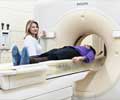Assurance of a cancer-free status did not prompt people participating in a long-term computerized tomography (CT) lung-cancer screening program to pick up their cigarettes
Assurance of a cancer-free status did not prompt people participating in a long-term computerized tomography (CT) lung-cancer screening program to pick up their cigarettes again, researchers wrote in a study published in Cancer Epidemiology, Biomarkers & Prevention, a journal of the American Association for Cancer Research. The December issue contains a special focus on tobacco.
These findings should negate widespread concern in the lung screening community that reassurance provided by screening, and particularly by a negative screening result, might reduce the motivation to quit smoking among current smokers or lead to resumption of smoking among former smokers, according to the researchers."For some reason, people have thought that those who do well in lung cancer screening will feel reassured enough to begin smoking again, but there is no evidence of that in our study," said the senior investigator David M. Burns, M.D., professor emeritus at the University of California, San Diego. "This evidence should provide some comfort that CT scanning does not result in a deleterious effect on cessation."
Lung cancer death is the largest cause of cancer death in the United States, and late stage of disease at diagnosis results in five-year survival rates of only 13 percent, according to the researchers. Therefore, screening for lung cancer is "an attractive target for early detection," they wrote. But evidence on cessation activity from studies of screened populations is scarce, and follow-up has been limited to three years.
The study is part of the Early Lung Cancer Action Program (ELCAP), in which 2,078 participants received annual screenings and periodic smoking-behavior surveys over a follow-up period as long as 12 years. In this substudy, abstinence was examined among 730 smokers, 1,227 former smokers who quit for one year or more at enrollment in the study and 155 smokers who quit during the study's follow-up.
The reassurance provided by lung cancer screening was assessed by comparing smoking behaviors of those with negative scans to those with positive scans, which further testing showed was not malignant. The goal of the study was to define whether consistently negative screening results were associated with less cessation and more relapse over a six-year interval in participants undergoing annual CT screening for lung cancer.
Researchers found that participants who consistently received a negative CT scan had a 28 percent lower likelihood of abstinence from one follow-up to another, compared to those who had a positive result. But over a six-year period, that difference disappeared. There was no significant difference in likelihood of relapse between those with positive and negative scans among any of these groups: former smokers, recent quitters or current smokers who quit during the study.
Advertisement
"This is the first examination of smoking cessation outcomes in a population of individuals being screened for lung cancer with follow-up that is longer than three years, and it shows us that reassurance provided by a negative scan may not be a factor determining long-term abstinence," he said.
Advertisement
Source-Eurekalert















